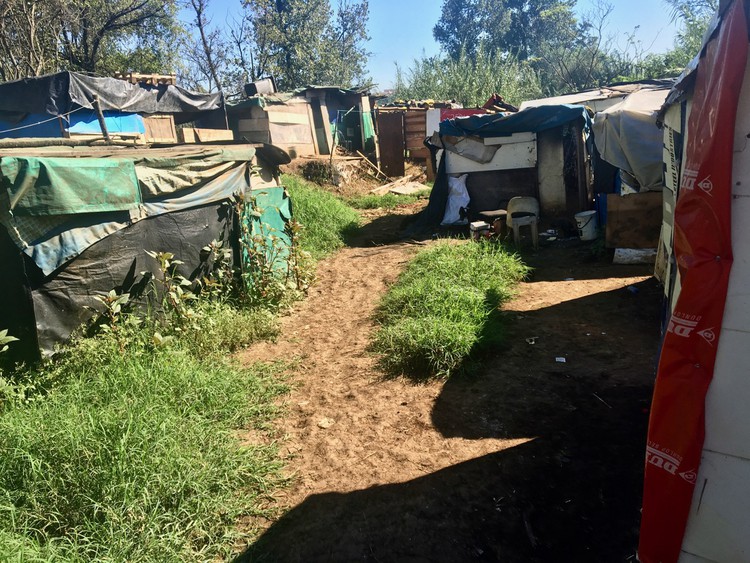I love it here, says dump site resident
Families living next to New England landfill say they can walk to collect their groceries
“Some may call it Gomorrah, but this is our home,” says Joseph Mlambo. Three years ago he joined more than 50 families who live along the Msunduzi River opposite the New England municipal landfill site in Pietermaritzburg.
Their homes are made from mud, cardboard and tent materials, and surrounded by trees and long grass. “I love it here. I wouldn’t want to move. We call this place the ‘Forest’,” says Mlambo.
There is no electricity and people use candles. They fetch water from a tap a kilometre away. When GroundUp visited, naked children could be seen playing. Some men and women were drinking beer in a tiny house, known as the “tavern”.
“We call the police if we need them. Police know we live here. The municipality has never threatened to evict us. We are not bothering anyone. We don’t steal from anyone. We walk to get our groceries at the dumpsite,” a resident told GroundUp.
Mlambo refers to the dumpsite as “our company”. “We pick our items from the dump and sell them … No one takes taxis. There are no worries about transport money. We have become a small community that understands each other. Almost everyone knows each other,” says Mlambo.
He collects and sells plastic containers and cardboard boxes. He can make up to R2,000 a fortnight, far more than he earned working for a construction company back home in Lesotho. His mother and his four-month-old son live with him. He visits the rest of his family in Lesotho during the December holidays.
Resident Portia Lombo says the trees take away the bad odour. She and her partner are also waste pickers. Lombo’s partner built their two-roomed home from material collected at the dumpsite.
“We work in shifts. My partner rests during the day. We take turns. When I come back he goes and does his night shift. We pick up food from the dump. Groceries are the least of our problems … We [the community] have young children who were born here. They eat what we eat. Most of them are too young to be at school,” says Lombo.
“I came here in 2016. It is not a good place but we are used to it. We have to survive and feed our families back home. I’m Sotho but I have learned Zulu,” said Lombo.
Mlambo said rain is a problem as then they can’t cross the river. “Other than that, we are fine here,” he says.
Support independent journalism
Donate using Payfast

Don't miss out on the latest news
We respect your privacy, and promise we won't spam you.
Next: Humansdorp families stuck in emergency housing since 2011
Previous: Khayelitsha hospital under the spotlight
© 2018 GroundUp.
This article is licensed under a Creative Commons Attribution-NoDerivatives 4.0 International License.
You may republish this article, so long as you credit the authors and GroundUp, and do not change the text. Please include a link back to the original article.

